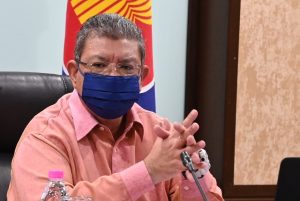Military-ruled Myanmar could be excluded from this month’s summit of the Association of Southeast Asian Nations (ASEAN) if it refuses to cooperate with the bloc’s special envoy, Malaysia’s new foreign minister announced yesterday.
In August, the 10-member Southeast Asian bloc selected Brunei’s Second Foreign Minister Erywan Yusof as its special envoy to Myanmar, to help solve the political crisis that has followed the military’s seizure of power in February.
But the junta’s marked lack of cooperation with the envoy has prompted Malaysian Foreign Minister Saifuddin Abdullah to suggest that it might be excluded from the summit scheduled for October 26-28.
Following a virtual meeting of the 10 ASEAN foreign ministers yesterday, Saifuddin said in a post on Twitter that Malaysia had expressed its disappointment at the junta’s lack of cooperation with Erywan. In a post on Twitter, he said that “unless there is progress, it would be difficult to have the Chairman of the SAC [the military junta] at the ASEAN Summit.”
Indonesia’s Foreign Minister Retno Marsudi also raised the issue of Myanmar’s participation in the upcoming ASEAN Summit during a news conference following yesterday’s ministerial meeting. “Some member countries are of the view that ASEAN should not act ‘business as usual’ with regards to this development,” Retno said. “In Indonesia’s view, it is time for ASEAN foreign ministers to report this situation to the nine ASEAN leaders, and to receive a directive on how ASEAN should engage with Myanmar, especially in connection with the 38th and 39th ASEAN Summits.”
The comments from the Malaysian and Indonesian ministers, whose governments have led the bloc’s efforts to resolve the Myanmar crisis, came after news last week that the junta would not grant Erywan access to detained civilian leader Aung San Suu Kyi.
Shortly after his appointment, Erywan promised that he would seek a meeting with Aung San Suu Kyi as part of his goal of pursuing dialogue “among all parties,” and that a request had been submitted to the junta to this effect. But a Myanmar military spokesperson told the AFP news agency on September 30 that it would be “difficult to allow for meetings with those who are facing trial.” The 76-year-old leader is currently on trial on a range of outlandish charges, from sedition to illegally importing walkie talkies, which are seemingly designed to sideline her from political life permanently.
The junta’s refusal to grant the envoy access to “all parties” was unsurprising, given the junta’s lack of cooperation with he implementation of the Five-Points Consensus agreed by ASEAN at a special summit in Jakarta in April, which, in addition to the appointment of a special envoy, included calls for inclusive dialogue and the delivery of humanitarian aid.
“Time and again since the coup, the junta has played ASEAN for a fool, using it to try and gain legitimacy, while at the same time increasing its brutal reprisals against the people,” Charles Santiago of the advocacy group ASEAN Parliamentarians for Human Rights said in an emailed statement yesterday. “Here we have yet another example of the junta failing to hold true to its promises.”
Since the coup, ASEAN leaders have recognized the threat that the Myanmar crisis poses to the bloc’s legitimacy and claims to occupy a position of “centrality” in Asia’s diplomacy. In March, Singaporean Foreign Minister Vivian Balakrishnan said in a statement that failing to take meaningful action in the case of Myanmar “would starkly underscore our lack of unity, and undermine our credibility and relevance as an organization.”
But the bloc’s accommodating approach – one that basically took the junta at its word – has underscored international perceptions of ASEAN as a forum of complicity and inaction, which has manifested inside Myanmar in the strange sight of ASEAN flags being burned in the streets.
In this context, the announcements by the Indonesian and Malaysian ministers mark a welcoming strengthening of the ASEAN position toward the country’s junta, and a sign that the bloc is beginning to lose patience with the obduracy of Sen. Gen. Min Aung Hlaing.
While ASEAN’s Charter does not contain an explicit power to expel or suspend a nation’s membership, Aaron Connelly of Singapore’s International Institute for Strategic Studies noted yesterday that Article 20 of the Charter does contain a broadly worded provision stating that “in a case of a serious breach of the Charter or non-compliance, the matter shall be referred to the ASEAN Summit for decision.”
This would seem to grant the other nine members of ASEAN the scope, if they are able to cobble together the requisite consensus, to craft a new terms of reference for the bloc’s engagement with its perpetual problem child.

































